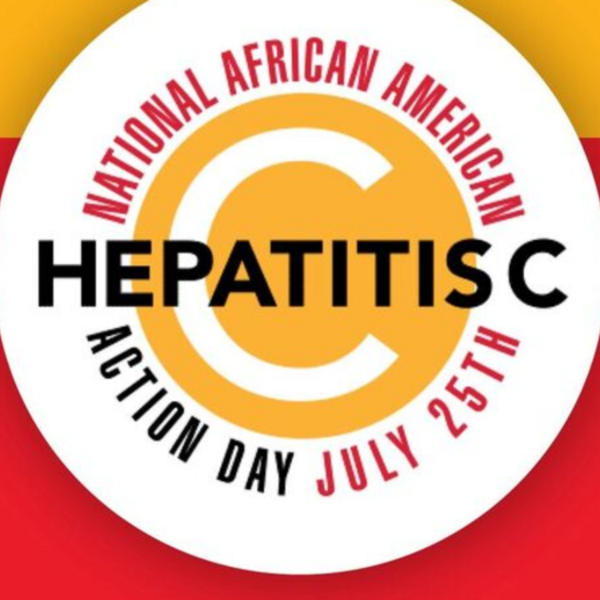
2023 National African American Hepatitis C Action Day (NAAHCAD)
July 25, 2023, is the 11th annual National African American Hepatitis C Action Day, an observance meant to highlight the disproportionate impact of hepatitis C on Black Americans and efforts to combat this disparity. This observance was established in 2013 by the National Harm Reduction Coalition and the National Black Leadership Commission on Health (NBLCH), formerly the National Black Leadership Commission on AIDS. Though African Americans make up 11% of the total population in the United States, they make up a quarter of the estimated 3.2 million people living with chronic Hepatitis C infection.
Although viral hepatitis is a leading infectious cause of death in the United States, the majority of people living with a hepatitis C infection are unaware of their status as symptoms can take decades to appear.
In 2020, CDC released recommendations for hepatitis C screening among adults, citing that strengthened guidance for universal hepatitis C testing is warranted to ensure health care equity and the success of expanded hepatitis C screening. Additionally, CDC recommends single-visit, automatic reflex to HCV RNA testing to ensure individuals are diagnosed and linked to treatment in a timely manner.
Among people living with HCV, 55-85% will experience chronic, or long-term infection. Chronic liver disease, often hepatitis C related, is a leading cause of death among African Americans ages 45-64. Additionally, Black Americans over the age of 60 are ten times more likely to have chronic hepatitis C.
The Department of Health and Human Services Viral Hepatitis National Strategic Plan for the United States 2021-2025 set a goal of reducing hepatitis C-related deaths among African Americans by ≥30% by 2025. Their recommendations to achieve this reduction include increased testing and referrals to effective treatment, the development of culturally responsive technical assistance and educational materials, and the implementation of educational campaigns to dispel myths about who is vulnerable to hepatitis C infection.
A recent CDC press release called for a “transformative national response” to hepatitis C. According to a new report, although nearly ten years have passed since highly effective breakthrough treatments were approved, most people in the United States with hepatitis C have not been cured. Despite the existence of lifesaving treatments, hepatitis C was listed as the cause of death for more than 14,800 people in 2020. Cost remains a barrier to treatment, especially among the uninsured – on average, 1 in 4 people without insurance have been cured, and 1 in 6 uninsured people under the age of 40 were cured between 2013 and 2022. Amongst people with health insurance, restrictive treatment coverage policies prevent people from receiving care – insured people over 60 make up the largest proportion of people cured, but this number accounts for less than half of the people affected. Proposed solutions include encouraging insurers and policymakers to remove treatment coverage restrictions as well as an innovative national hepatitis C drug delivery model to make treatment more affordable and accessible for all Americans, including the un- and under-insured. The White House has requested funding to make this model a reality.
The advancement of health equity, racial equity, and stigma elimination, especially among disparately impacted groups, are core parts of NASTAD’s Strategic Plan. NASTAD’s Hepatitis Team is leading several initiatives that prioritize these goals by centering the voices of people who have lived experience with HCV. The Hepatitis Network for Education and Testing (HepNET) is a partnership between NASTAD, the National Viral Hepatitis Roundtable (NVHR), and the National Association of County and City Health Officials (NACCHO) focused on improving the health of people who inject drugs (PWID). This network of health departments, community-based organizations, tribal health organizations, healthcare providers, and people with lived experience is committed to identifying and addressing the unmet needs of PWID by improving access to education, prevention, testing, linkage to care, and treatment through an equity-focused framework guided by the perspectives and expertise of people who inject drugs.
The Hepatitis Technical Assistance Center (HepTAC) is an online technical assistance (TA) and capacity-building center for health department hepatitis programs. HepTAC provides on-demand technical assistance to health departments on a variety of viral hepatitis topics including health equity and stigma. Housed within HepTAC is the Virtual Learning Collaborative (VLC), a learning community and training series aimed at assisting state, territorial, and local health departments in implementing prevention and surveillance activities outlined in the CDC's Integrated Viral Hepatitis Surveillance and Prevention Funding. In the second year of the VLC, the focus was on addressing health equity topics. These topics encompassed utilizing a health equity approach to enhance data collection and the utilization of demographic data. Additionally, the VLC emphasized involving non-traditional partners and individuals with lived experience in the planning and execution of elimination strategies.
On this day, and every day, it is imperative that we strengthen our prevention efforts by emphasizing the importance of education, outreach, and testing. As stated by NASTAD’s Executive Director, Stephen Lee, the core of NASTAD’s mission is an unwavering commitment to social justice, and the latest priorities of NASTAD’s Anti-Racism Workgroup show actionable steps toward operationalizing DEI work throughout the organization. NASTAD’s hepatitis team develops equity-focused tools that health departments and prevention partners can use to further this message and strengthen their capacity to bring an end to the syndemics of HIV and viral hepatitis.
Resources:
CDC Hepatitis Risk Assessment Tool
National Black Leadership Commission on Health – Black Health Learning Academy Course on Hepatitis C
CDC’s Know More Hepatitis Campaign
CDC Hep C resources, including free continuing education courses focused on screening, treatment, and management: https://www.cdc.gov/hepatitis/hcv/profresourcesc.htm
Things to know about Hepatitis C on National African-American Hepatitis C Action Day – Prevent Cancer Foundation
HHS Viral Hepatitis National Strategic Plan 2021-2022 Progress Report
NASTAD Talking Points: The Resource Guide for Facilitating Stigma Conversations